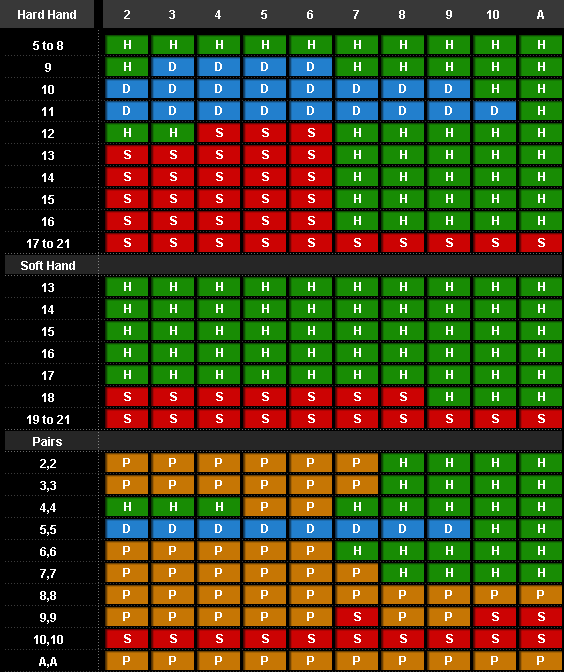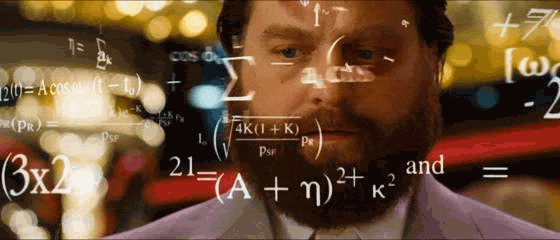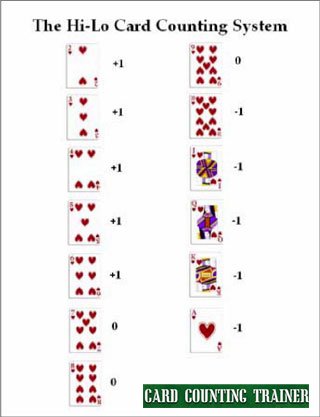Have You Ever Wondered How To Make Math Work For You? (an original story)
If you are like me... you really didn't care much for math back in school. It was boring and tedious and sometimes it was downright hard! Especially if you didn't have a good teacher!
What if I could tell you that there are certain mathematical principals that can work in your favor? What if you could go back to that high school math teacher (well maybe grade school math teacher in this case) and look him right in the face and say... "thank you!"
How can this be you might ask?
Well if you have ever been to a casino or ever want to go to a casino in the future than this post is for you... I'm going to be talking about the only beatable game in a casino and how you can use mathematics to beat it. The game I am talking about is Blackjack!
I say it is the only beatable game because it is the only game that has a history and the only one where the odds are ever changing depending on the cards that have been played previously. Knowing this, there is a way that we can use math to put the odds in our favor even more...
The first thing we need to discuss is how to use the basic blackjack strategy to put the odds in our favor. This is a chart of the basic strategy:
This is the basic strategy card you will use for most casino's (6 decks, stay on 17, etc.). You need to memorize it backwards and frontwards and sidewards and downwards and crosswards. The faster you can react to cards being played without thinking, the better! If you ever get the chance to play at a casino that has less than 6 decks you should play it! Your odds of getting blackjack goes up as the number of decks goes down. Just make sure they pay 3:2 on blackjacks. Therefor a single game deck is always your best chance to make money...
Now that we have the basic strategy memorized lets get into the good stuff...the stuff that will really help you make money... card counting! Although, let me warn you... It's really not as glamorous as it seems.
In fact, if you follow all the rules mentioned here and do them perfectly you will only have about a 52% success rate... that may not sound like much but if you play the basic strategy perfectly you have about a 49% success rate, meaning that if you play it perfectly you will still lose if you play long enough... This isn't about winning massive amounts of money every time you play (although sometimes you will), it's about taking that 52% advantage and playing long enough to let those odds work in your favor. In theory, every 100 hands you play you will win 52 of them (although it won't work out exactly that way, but just giving you a visual idea). Therefore, once this strategy is mastered the goal should be to play as many hands as possible to maximize your income!
Card Counting 101:
I am going to teach you a very basic but effective method. It's called The Hi-Lo method. For each card we are going to assign a number. For example:
2, 3, 4, 5, and 6 = +1
7, 8, and 9 = 0
10, J, Q, K, A = -1
All the low cards have a value of +1. The middle cards have a value of 0. The high cards have a value of -1. Hence the name... the Hi-Lo method. This is what as known as a balanced system, meaning that all the numbers will add up to zero when an entire deck is played through.
Why is it set up this way?
The low cards are of the most value to the dealer since the low cards help a dealer make his potential bust hands (12-16). The dealer must hit these cards which benefit the player, but when there are mostly low cards in the deck the odds of him making a hand out of these setups increases significantly. Inversely, an Ace is the most important card in the deck to the player since it is the key component to getting a blackjack which pays 3:2. Therefore it is important for the player to know when the deck is rich in low cards and when it is rich in Aces and high cards...
The dealer has the same chance as you as drawing high cards and aces as you do, but the dealer doesn't get paid 3:2 for a blackjack and that is where your advantage comes in...
Lets take a look at some examples
Listed below are some real world examples to give you a better understanding of what I am talking about. Lets say you are dealt a "5" and a "4"... what would the count be?
5 (+1) and 4 (+1) would give you a running count of +2 since they are both "low cards".
Lets take a look at another one. What would the count be if you are dealt a "9" and a "7"?
9 (0) and 7(0) = a running count of 0 because both numbers are "middle cards".
One more. What would the running count be if you are dealt a "10" and a "J"?
10 (-1) and J (-1) = a running count of -2 because both cards are "high cards".
As you can see it is pretty simple once you get the hang of it. The difficult part is that you are going to have to keep this number in your head for every card played throughout the entire deck, otherwise there is no point in counting.
How does the running count effect your bets?
First you have to convert the running count to what is known as the true count. To do that you need to divide the running count by the number of decks that are remaining. For example, lets say the count is +12 and there are roughly 3 decks remaining. Take 12 and divide by 4:
12 /4= 3
In this example 3 would be our true count. The true count is the most important figure to know and understand. If you have a high running count yet there are 5 decks left, that is not as significant as a high number would be with only 1 deck left... the reason for this is because a high running count with only 1 deck left means that of the remaining cards left you can predict with greater accuracy the next cards to be played.. make sense?
How to determine the size of your bets
Your maximum bet needs to be at least 4x your smallest bet. This is really how you make the most money, the more you are willing to bet when the odds are in your favor the bigger your rewards will be in the long run. Just remember you have to have a big enough bank roll that you don't blow your roll on a bad losing streak. For most players sticking with a 4x strategy is a good starting point.
More specifically...
When the true count is (0) or (-) the player needs to bet the least amount possible since the house has the odds in this situation.
When the true count is +1, bet your minimum bet.
When the count is +2, bet 2x your original bet.
When the count is +3, bet 3x your original bet.
When the count is +4 or higher, bet 4x your original bet.
This is where we will cap our betting strategy for this example, however, like I mentioned above, the larger your betting spread the more money you will make in the long run.
Some miscellaneous tips
Make sure you don't let the entire table know you are counting. It is not illegal but some casinos may kick you out if you are consistently beating them.
Don't let the other players at the table influence your betting decisions, it's not their money, it's yours!
Make sure to block out all of the other noises and people in order to stick to your strategy.
Make sure you practice for many hours before you ever risk real money.
As you can see all you need in order to do this is have a good understanding of basic mathematical principals. The only functions needed are basic addition, subtraction, and division. That's it. Now you can see how all that math you had to take is finally going to pay off and make you rich. You are now ready to dominate the world of Blackjack using math!
Live well my friends!
This has been an original story by @jrcornel based upon my own experiences and my own readings.
Sources:
https://www.blackjackinfo.com/blackjack-school/
Image Sources:
1. http://www.todayifoundout.com/index.php/2014/11/origins-mathematical-convention-using-x-unknown/
2. https://livedealersites.com/blackjack-card-counting-intro/
Follow: @jrcornel




Nice! I used to do this all the time. My friends called it cheating. I called it winning!!!
Ha! Really? I don't know anything about you but I just got this vibe about you that you might be interested in the same things I am! I use to count for a while but I was never able to make a lot of money at it. I did it enough though that I could see if I was willing to commit to doing it every week over long periods of time I could make a considerable amount of money... but as usual life gets in the way :)
Maths in school days was something very boring... but this seems to be interesting.
It is :)